Last week, I spoke with Oren Langberg, the CMO at Uncaged Studios, about their Web3 soccer game, MonkeyLeague. Oren told me about the game, its gameplay and why he thinks it is unique and different from other games existing on the market. He also shared their plans for building an entire ecosystem with a franchise of games dedicated to different topics. If you are into gaming and Web3 technologies, don’t miss this piece!
U.Today: Oren, you are the CMO at UnCaged Studios. Tell us about the studio. What made you interested in Web3? How did you join the project?
Oren Langberg: I'm a lifelong gamer and a longtime marketer as well. I've worked in various companies over the last 15 years or so. For me, it's really humbling to finally be able to combine both of those passions. It is awesome to be a part of the industry as a whole, that's for sure. UnCaged came out of stealth with MonkeyLeague just under a year ago, last October. When I was approached to join UnCaged, my career up to then was largely in B2B so the opportunity without diving deeper was exciting.
Then I understood who the founders were and what we were building. Raz Friedman, known as the Bobby Fischer of gaming, was the first employee and Chief Product Officer at Playtika, one of the biggest mobile gaming companies in the world. Then there is Shahaf Bar-Geffin, a Web3 OG, ninja, and visionary — he's like the Magellan of crypto. Meeting them sealed the deal, and the rest is history. Since our founding, the studio has grown to nearly 45 people. Everything is done in-house, which is really unique within Web3. There are a lot of like projects — I don't like the term “project” because it sounds very temporary — but there are a lot of games out there where they outsource a lot of the work, even the game development itself.
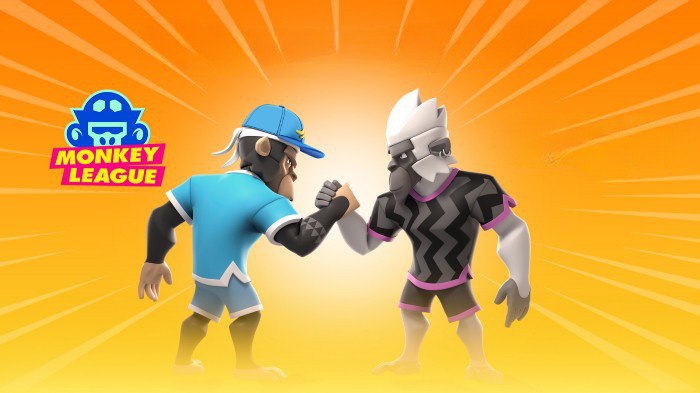
We're very proud to say everything is done in-house, and we've grown a really strong and passionate community, which is definitely not easy. They see MonkeyLeague as a nice fit and as an awesome game. We've also released several features along the way, with a very aggressive timeline. Usually, games take a few years to be developed through all optimization and iterations. We've definitely accomplished a lot there.
U.Today: MonkeyLeague is a Web3 eSports game. Can you tell us more about its gameplay?
Oren Langberg: With regards to gameplay, MonkeyLeague soccer is the first release in a franchise of Web3 sports games that we are developing. It's groundbreaking what we're building: a whole franchise of games with a vast ecosystem around it offering multiple ways to play and potentially earn. We are starting with MonkeyLeague soccer, and then following sports games that will all leverage the same NFT game assets that are out there in the market right now. This adds a lot of utility.
The simplest way to describe MonkeyLeague is to imagine FIFA Street and chess had a baby. But to put it a little bit more delicately, imagine you were able to combine the excitement, energy and competitiveness of soccer with the strategic thinking of chess. It is a mesh between the two, that hasn’t been done before. So, we find it super interesting to create a casual form of sports gaming.
That's essentially MonkeyLeague: it's a fast turn-based Web3 soccer game. It's easy to learn yet hard to master.
Essentially, players build their dream team of at least six MonkeyPlayer NFTs that fill the positions of striker, midfielder, defender, and goalie. The main objective in the game is to score goals, play matches and tournaments, and climb the Leagues’ ranks. It's super straightforward, and there will be a whole esports component that brings a whole level of competitiveness.
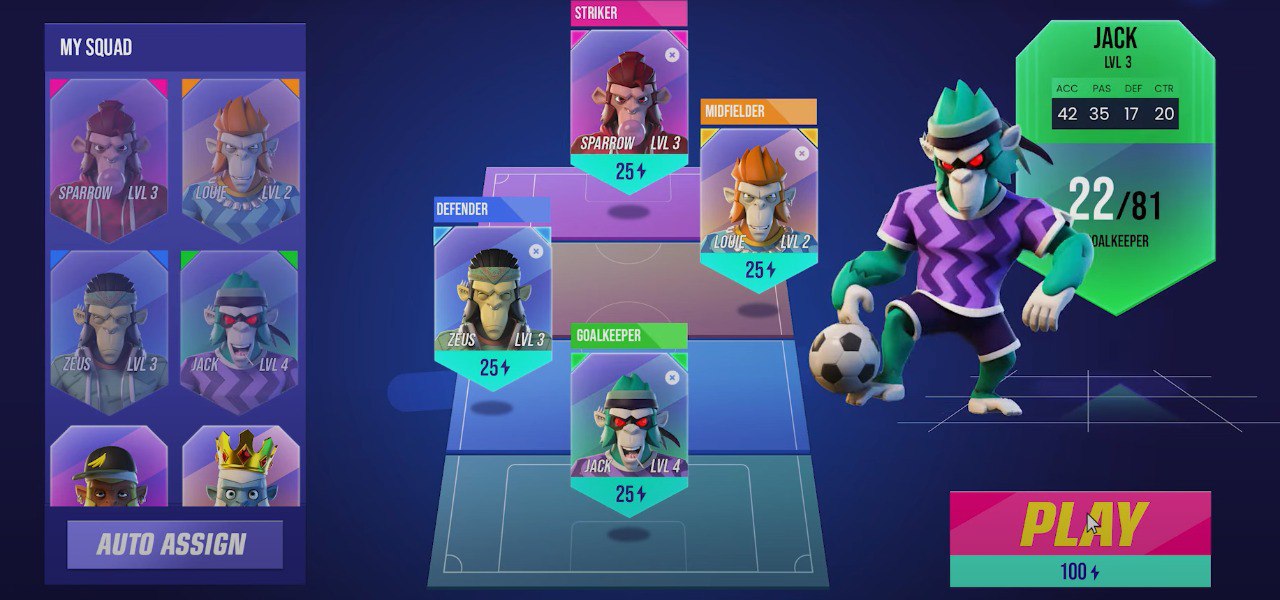
The NFTs themselves are all done in-house and top quality. Not only do the Monkey NFTs come with a unique appearance and traits but also core game skills. MonkeyPlayers’ game skills are Accuracy, Passing, Control and Defense, which come with a starting stat and a max potential level they can reach. Through matchplay, your goal is toincrease those stats, level up, and earn XP on your NFT - which then enables players to update their NFTs. You bought NFTs with these skills, and now you can update them, and they'll have these skills, which makes them more valuable on the market.
When it comes to our vision of what we're building and how we see the current play-to-earn market, from the get go, we have focused on high production value and entertainment value. Games are supposed to be fun first. Even before GameFi 2.0 became trendy, our mission was to create high production value, AAA quality games that were fun first and didn’t use earning as the primary way to get people to play the game. We put a lot of attention into game mechanics, game design, the game loop and meta features around, to make it the most fun game possible.
U.Today: Can you tell us about your token, MBS?
Oren Langberg: Sure, the main in-game currency is MonkeyBucks $MBS. It will be used to receive rewards for winning matches, and tournaments. It will also be used for transactions like breeding, which is coming up soon, to purchase or rent from our future marketplace, to stake MBS, which is live now, and then also, as I mentioned, to get those in-game essential items.
This is a good place to mention that we're doing something break through in that we're combining the free-to-play gaming model with the play-to-earn model. Inside of the game, we have an in-game store where you can buy in-game essentials, like Nutritional items for Stamina, Medcare items for HP, and Energy for matches. This also ensures constant circulation of the currency, as opposed to many play-to-earn games where players might earn money, but then they just dump that currency immediately after.
U.Today: Do you have just one token, or are there any others?
Oren Langberg: As I mentioned at the beginning, we're creating an entire ecosystem. MonkeyLeague soccer is the first in a franchise of games, so each game will have its own in-game currency. But there will be a DAO token, $SCORE, that governs over the whole ecosystem. The only way you'll be able to get $SCORE is to stake $MBS long term.
U.Today: Can you give us more details about staking?
Oren Langberg: We were super excited about that because it wasn't initially on our roadmap. We got a lot of requests from our community for a staking program and we prioritized it against other features. We launched it at the end of June, and there are five million in total claimable $MBS rewards, relative to how much you stake and how early on, but we definitely created it to be an ultra rewarding program. There is a 90-day locked period and still a month left with very good APR. There's still a month left to start claiming rewards.
U.Today: Tell us about breeding mechanisms. How can users get a new monkey?
Oren Langberg: Breeding is just around the corner and we're super excited about it! We launched a couple minor features up to now, but breeding is a very big, complex, and super fun game feature, as it adds a whole layer of a fun gaming experience. You have your MonkeyPlayer NFTs and the opportunity to create more MonkeyPlayers to add to your team or sell on the market. To breed, you'll need two breedable monkey player NFTs and a capsule.
Breeding capsules are very important, as we've had the luxury of learning from other games and the issues they have encountered. A big issue encountered in a few games is an uncontrollable population level. Once it reaches that point, it's not a good sign for the game, and for the game economy because it’s hard to go back. To have a sustainable game and game economy, population increases need to be balanced with other aspects of the game and economy. Breeding capsules are a way for us to be able to grow the population within the economy and the player ecosystem. With two breedable monkeys and a breeding capsule, you'll be able to breed.

Even if you have only two monkeys right now, and you need six for a full team, you'll be able to fill out your team with a breeding capsule. It's an amazing opportunity for people who maybe only have two Monkeys, and they want to fill out a team, or if you already have six Monkeys and you want substitute players to add onto your team. Or if you have lower-stat Monkeys within each breeding season and you breed them together, you actually have the probability to get a stronger monkey player than the parents. That's pretty exciting.
U.Today: Why did you choose the Solana blockchain on which to base your game?
Oren Langberg: We believe that Solana is not only a super strong network now, it's only getting stronger. Its speed and low fees make it ideal for a web3 game. In addition, they have a pretty strong ecosystem geared towards gaming. In my eyes, Solana has a bright future but there’s no reason chain communities should be siloed. In the end, if you ask me where we'll be in a couple of years, we'll be chain-agnostic. We definitely want to be chain-agnostic and connect to different networks. With MonkeyLeague, there's a clear separation between the game and the Web3 components, like the economy and assets and things like that. The game can be played anywhere, so we definitely have those plans.
U.Today: What are the aspects of the game you are most proud of?
Oren Langberg: There's a lot to be proud of. But when it comes to the game, first and foremost, I like that it’s unique. We're not creating another game that's already out there but a little bit different, but rather, we're trying something new in strategy, turn-based sports games. As I mentioned in the beginning on one of the reasons I came aboard was the vision of what we are building. It's also super unique. To build a team of Monkeys and to play the matches is actually just one layer in a vast, interconnected, multi-role ecosystem we're building. What does that mean?
When you think about sports, let's say soccer, example, there's no money in a 12 year old playing the sport. But he just loves to play. And most people think that in professional soccer, the money is on the field with the players, right? Like Ronaldo and Messi. However, most of the money, most of the business, and 99.9999% of the industry's roles are not players at all. They're managers, league owners, scouts, stadium owners, landowners, bankers, promoters, broadcasters and so on. This is what we're building at UnCaged - a vast ecosystem providing a range of people to play “their game” and earn. This also further blurs the line between reality and virtual worlds.
Another thing is our use of soulbound tokens. We're really looking to the future, and the future is not just in in-game currencies and tradable assets but also non-transferrable social tokens. SBTs aren’t a new thing as they were actually introduced in gaming years ago. Soul-bound tokens are never purchased nor are they tradeable. They will be achieved in the game by accomplishing objectives or reaching certain tiers. They remain with that player for life. Let's say, for example, someone wins X amount of games in a row or own Y amount of Stadiums. As a result, they receive a soulbound token, or status, within the MonkeyLeague ecosystem that gives them a bunch of new benefits. It maybe ups them a League or opens up field environments or campaigns, or unlocks private game features – which is all very exciting!
U.Today: What are your thoughts on play-to-earn gaming in general?
Oren Langberg: I have a lot of thoughts on that, but I'll try to keep it simple. The rise of Web3, the evolution of Web2 to Web3, opened a lot of doors for gaming especially. I'm not going to go into the entirety of what it does, redistribution of ownership and things like that, but I more want to get into how play-to-earn came about and its shortfalls.
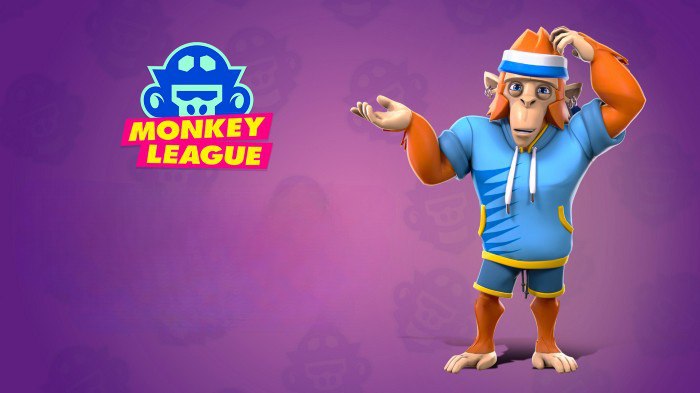
To many play-to-earn games gave a living wage. People in developing countries were able to leave other staple jobs, play video games all day and earn good money. But what this did was open a Pandora's box of bad, low-production-value games that focused less on entertainment value, visual quality, and game mechanics, and more on using the earning mechanism as a primary reason to play. This system of untamed rewards is not sustainable. It's like the opposite of a casino where, instead of the house always winning, all players always win something. That casino wouldn’t last long, like a Trump casino. For Web3 gaming to really succeed, to be sustainable and go mainstream, it first and foremost needs to be high-production-value gaming. This means that not everyone earns no matter what, but skill and achievement-based earning is the only way to really maintain a sustainable economy. We are starting to see more and more web3 games focusing on the quality and fun-first aspect which is great.
We have a full plan to bridge web2 gamers into web3 and that starts with the necessity of having high quality, fun gaming. In addition, we're going to offer free-to-play versions for Web2 gamers to test the game before they purchase game assets and get competitive. Our pipeline of partnerships outside of web3 will also help offer a stamp of approval and validation.
U.Today: Are you into NFTs yourself? Do you have a collection of NFTs?
Oren Langberg: I dabbled a little bit in crypto prior to starting here, but more on the currency side. I do obviously have some MonkeyLeague Monkeys because I intend on tearing it up on the field, but I'm not a big NFT collector per se.
U.Today: Let’s speculate on the Bitcoin price. It’s our regular question, and I only need your guess. What will the Bitcoin price be at the end of this crazy year?
Oren Langberg: It is tough to speculate, but I'm a glass-half-full kind of person. I really think we're reeling for a big bull run. I can't say when it's going to happen, but it reminds me of the COVID lockdowns. Everyone's locked down for so many months, and they're all amped up and they're itching to get out there. I really feel like the crypto market is itching to erupt its just waiting for the gun to fire that starts the race. As soon as there's that green light, so to speak, whatever form that comes in, it's really going to take off. So, at the end of the year — 44K.
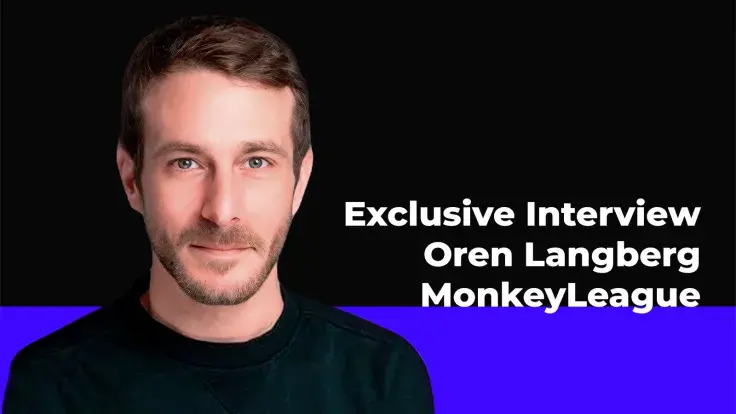

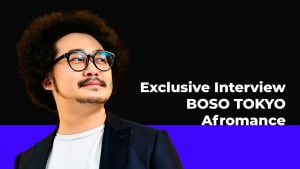

 Dan Burgin
Dan Burgin Vladislav Sopov
Vladislav Sopov